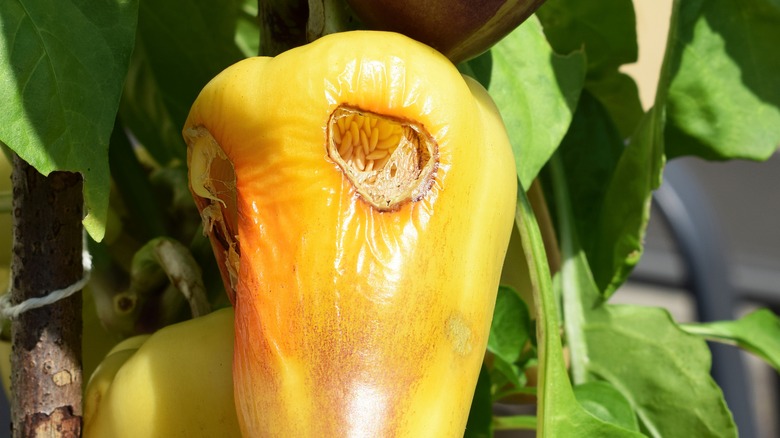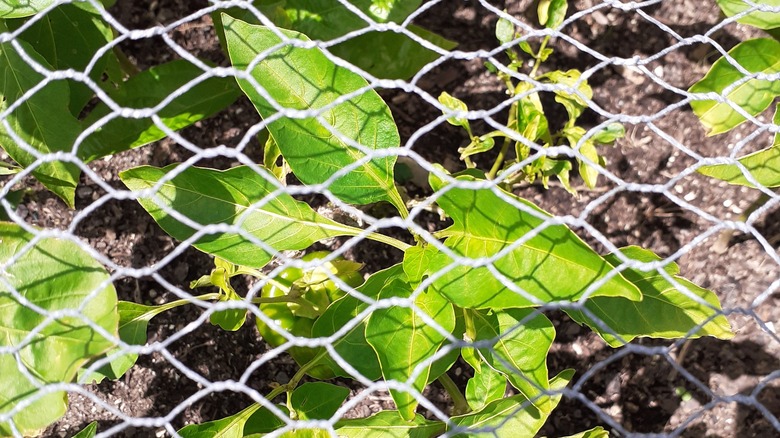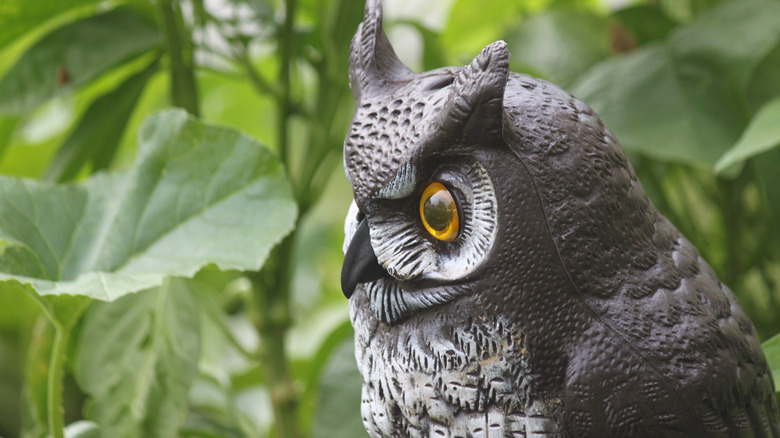How To Stop Birds From Feasting On The Peppers In Your Garden
A well-balanced garden includes beautiful vegetable plants and the right wildlife to encourage pollination. While you're likely more than willing to welcome bees and worms into your yard to help support your pepper growth, too many birds can be a problem. Some birds will eat pepper plants, especially if there are any insects on or near them. What's more, even when birds just roost on your pepper plants, the chances of them damaging the plant are high. To stop birds from engaging in this activity, you'll want to consider strategies like netting and visual deterrents to keep them away.
Birds eat all types of peppers. In some cases, the bright colors attract birds, encouraging them to peck at the peppers. They tend to be good for a bird's health since they are high in beta-carotene, Vitamin C, and potassium. Even if you plant hot peppers, birds are still likely to munch on them. They can't taste the spice of these peppers but benefit from the nutrients in them. Birds like peppers so much that some people plant them to encourage more avian visitors in their yards.
However, from the pepper plant standpoint, birds are problematic. They create small holes in the peppers, causing them to rot long before they are ripe enough for you to pick them. The rotting vegetable also attracts pests, which can worsen the health of the plant. Not planning for the threat of birds is one mistake you can make when growing peppers.
Create a protective barrier to keep birds out
The most effective way of protecting your pepper plants is to use a barrier. Growing peppers in a greenhouse is one option, but when that's not possible, consider using bird or butterfly netting. You can also use mesh placed around the plants. Chicken wire with small holes can work well. This allows for ample sunlight while limiting birds' access. Using a tomato stake with netting draped over it can be helpful since it doesn't overly limit the growth of the plant and allows you to have easy access to the peppers.
If you have a row of pepper plants in your garden, use an arch-style barrier with netting over the top to protect the plants. You can do this for the entire row at one time, making it very easy to allow water and sunlight in while keeping other pests out. Keep in mind this limits access to the plants by pollinators, so consider deploying this netting strategy after your plants have blossomed and are beginning to form the peppers. Birds will try to get into the netting, so it needs to be pulled tight and fastened to the structure. If you're planning to plant peppers in containers, keep them closer to the house where birds are less likely to visit. You can use the same netting or wiring strategies for your container plants.
Use deterrents to keep birds away from your pepper plants
Another option is to make your garden feel less safe for the birds. In short, you want the bird to think there's a risk present that wards them off. You can do that in several ways. Start with the use of reflective items placed in the garden. You can use anything from a silver balloon, a shiny windchime, and pinwheels with bright colors. The movement and shine from these objects are a distraction to birds, who will simply move on to another area to use as a food source. Another option is to use fake predators in your yard. If you don't want to put a human-like scarecrow in your garden, choose a fake owl. The presence of the owl is one aspect that will deter them, but some are designed to make noise when birds come into the area. That makes it frightening to birds who come near to it.
You can also encourage birds to stay away by giving them an easier option to find food. For example, you can place a bird feeder on the opposite side of your yard. The bird feeder draws birds to your yard, where they're not harmful, and food is easy to access. Keep it full and choose a bird food that the local birds enjoy.


